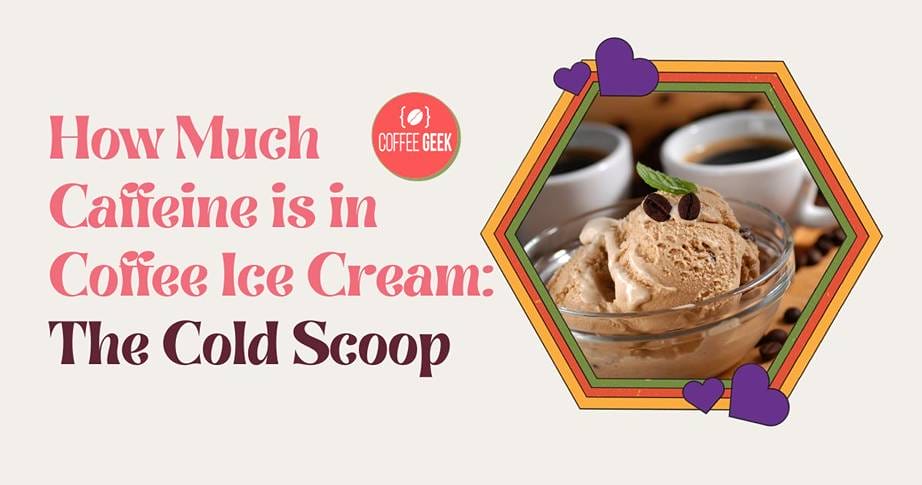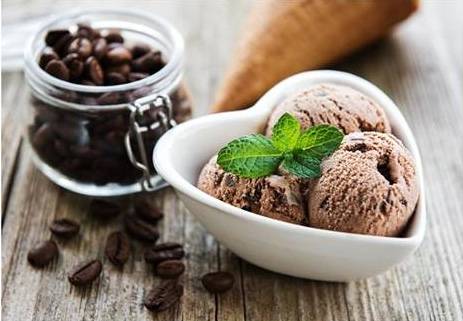Coffee ice cream is a delicious treat that many people enjoy, but one common question that arises is how much caffeine is in coffee ice cream actually.
The caffeine content in coffee ice cream can vary based on factors such as ingredients and brand.
Generally, coffee ice creams do contain some caffeine, although the amount is typically less than that found in a cup of coffee.
Caffeine in coffee ice cream varies depending on whether the ice cream is made with real coffee, coffee extract, or artificial flavors.
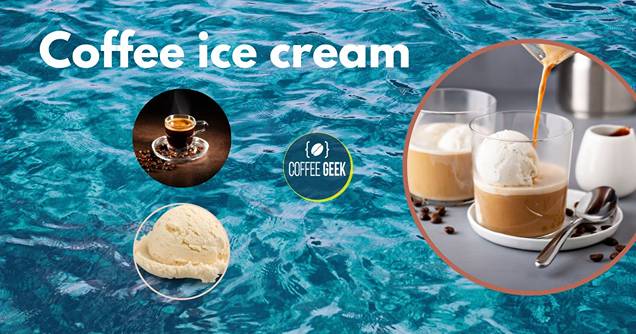
Additionally, the type of coffee beans used can also impact the amount of caffeine present, with some beans containing higher levels of caffeine than others.
Although most brands of coffee ice cream do contain caffeine, it is important to be aware of this if you are sensitive to caffeine or are seeking a caffeine-free treat.
Key Takeaways
Coffee ice cream contains varying amounts of caffeine depending on ingredients and brand
Real coffee, coffee extract, and the type of coffee beans used impact caffeine content
Be aware of caffeine in coffee ice cream if sensitive to caffeine or seeking a caffeine-free treat
- Caffeine Content in Coffee Ice Cream
- Ingredients Impacting Caffeine Content
- Popular Coffee Ice Cream Brands
- Specialty Coffee Flavors
- Decaf and Caffeine-Free Coffee Ice Cream
- Factors Affecting Caffeine Sensitivity
- Nutritional Considerations for Coffee Ice Cream
- Caffeine and Health Effects
- Frequently Asked Questions
Caffeine Content in Coffee Ice Cream
How Much Caffeine is in Coffee Ice Cream?
How much caffeine is in coffee ice cream depends on the brand and recipe. Generally, a single serving of coffee ice cream contains a moderate amount of caffeine.
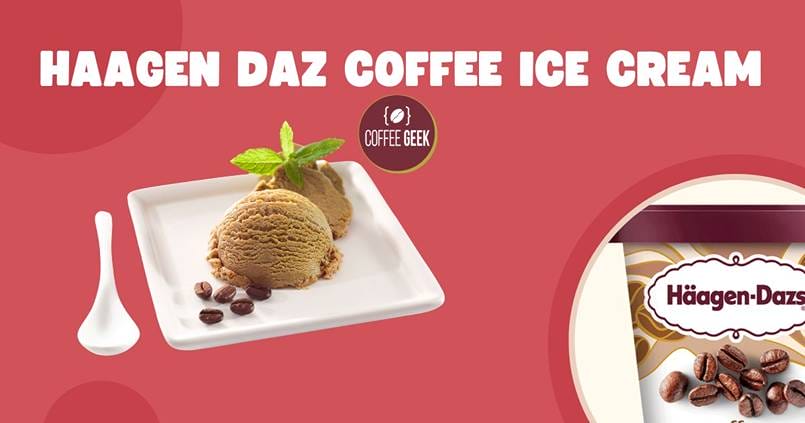
For instance, one cup (8 oz) of Haagen Daz coffee ice cream has around the same caffeine content as a rounded teaspoon of instant coffee, approximately 60mg – an amount similar to a shot of espresso.
Some other brands, like Talenti Coffee Chocolate Chip, have less caffeine with each serving yielding 45 milligrams of caffeine.
Check out this article if you’re concerned coffee ice cream will keep you awake.
Measuring Caffeine Content
Determining the exact amount of caffeine in coffee ice cream can be challenging due to the different formulations by ice cream manufacturer.
However, some brands provide caffeine content information on their labels or online for consumers to make informed decisions.
A general rule is to estimate the caffeine content when consuming coffee ice cream by comparing it to the standard caffeine content found in brewed coffee.
Comparing to Brewed Coffee
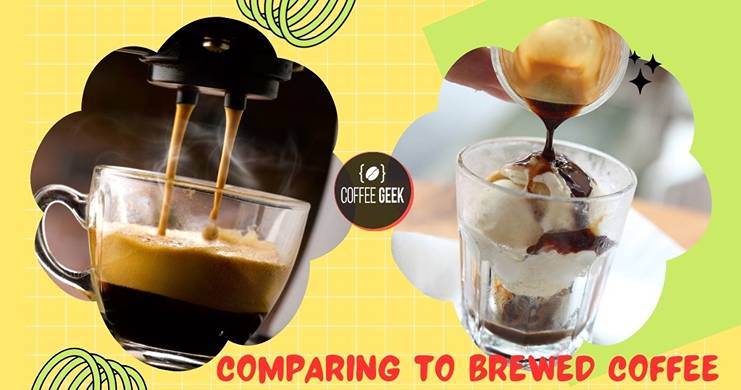
Coffee ice cream typically contains less caffeine levels than brewed coffee.
A single eight-ounce cup of brewed coffee has about 95 milligrams of caffeine on average, while a cup of coffee ice cream often falls in the range of 45 to 60 milligrams per serving.
It is important to note that individual sensitivity to caffeine varies; hence, the impact of caffeine consumption in coffee ice cream may differ among people.
However, coffee ice cream can be considered a considerably less caffeinated dessert option when compared to a cup of brew coffee.
| Coffee Ice Cream Serving Size | Caffeine Content (approximate) |
|---|---|
| 1 scoop (1/2 cup or 65g) | 0-3 milligrams |
| 1 small cup (4 fl oz or 120ml) | 3-12 milligrams |
| 1 large cup (8 fl oz or 240ml) | 6-24 milligrams |
Ingredients Impacting Caffeine Content
When determining the caffeine content in coffee ice cream, there are several factors to consider. The main ingredients that impact the consume caffeine are the type of coffee used and the brewing method employed.
In this section, we will explore how these two factors influence the caffeine in coffee ice cream.
Type of Coffee
The choice of coffee beans used in coffee ice cream plays a significant role in the amount of caffeine present.
Natural coffee, for instance, will contain more caffeine than coffee extract or artificial coffee flavor.
Additionally, some ice cream brands may use a combination of natural coffee and flavors, making it challenging to determine the exact caffeine content.
Generally, ice cream made with real beans will have a higher caffeine content than those made with artificial flavors or coffee extracts.
Brewing Method
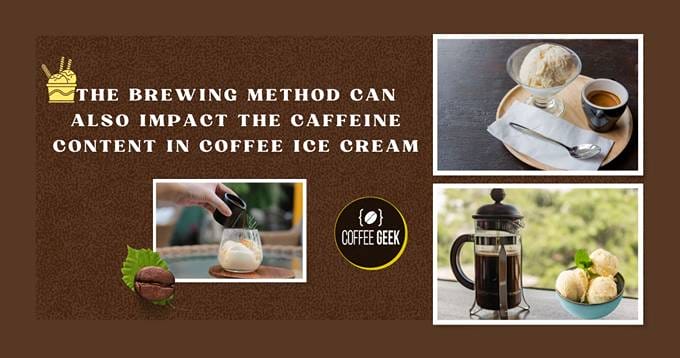
The brewing method can also impact the caffeine content in coffee ice cream.
For example, ice cream made with espresso-based coffee will typically have a higher caffeine content than ice cream made with other brewing methods, such as drip or French press.
This is due to the higher concentration of coffee solubles extracted by espresso machines, which results in a more potent coffee flavor and higher caffeine levels.
Moreover, the extraction process for coffee extracts or artificial coffee flavors may also alter the caffeine content. Some extracts may retain more caffeine from the coffee beans, while others may remove it altogether.
As a result, the caffeine content in coffee ice cream made with these ingredients may vary.
In conclusion, the caffeine content in coffee ice cream is influenced by the type of coffee and brewing method used in the production process.
To enjoy a coffee ice cream with a satisfying flavor and suitable caffeine content, it’s essential to be aware of these factors when selecting a brand or making it at home.
Popular Coffee Ice Cream Brands
In this section, we will discuss some popular coffee ice cream brands and their caffeine content.
Haagen-Dazs
Haagen-Dazs is a well-known brand for its rich and creamy ice creams. Their coffee ice cream is no exception, offering a delightful balance of coffee flavor and ice cream texture.
One cup (8 oz) of Haagen-Dazs coffee ice cream recipe contains around 60mg of caffeine, which is similar to the amount in a single shot of espresso.
Talenti
Talenti offers two coffee-flavored gelatos: Coffee Chocolate Chip and Coffee Toffee. Many people have wondered about the caffeine content in these products, prompting Talenti to include the information in their FAQ section.
Both gelatos have roughly 5 to 8 mg of caffeine, much lower than the amount found in Haagen-Dazs ice cream.
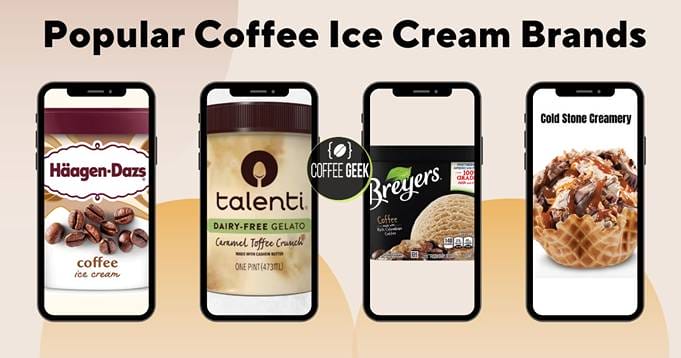
Breyers
Breyers is widely recognized for its natural flavors and ingredients. Their coffee ice cream stays true to this philosophy, using milk and cream from cows not treated with artificial growth hormones.
Although Breyers does not provide specific caffeine content information, its coffee ice cream is a delicious option for those seeking a natural approach to their frozen treats.
Cold Stone
Cold Stone Creamery is best known for its customizable ice cream, allowing customers to mix in various toppings and create their own unique flavor combinations.
While specific caffeine content for their coffee ice cream is not publicly available, the rich flavor and indulgent experience makes it a popular choice among coffee ice cream enthusiasts.
Specialty Coffee Flavors
Mocha Ice Cream
Mocha ice cream is a delightful combination of coffee and chocolate flavors. The base is typically infused with a rich coffee taste, while chocolate is swirled throughout to create a luxurious and indulgent treat.
The caffeine content in mocha ice cream can vary depending on the brand and the amount of coffee used to flavor it.
Some brands may also include actual espresso shots in their mocha ice cream, which can further increase its caffeine content.
As a general rule, though, mocha ice cream often contains less caffeine than its coffee-only counterparts.
Espresso Chocolate Cookie Crumble
Espresso Chocolate Cookie Crumble is a more adventurous take on coffee ice cream. It combines the bold taste of espresso with the decadent flavors of chocolate and cookie crumbles.
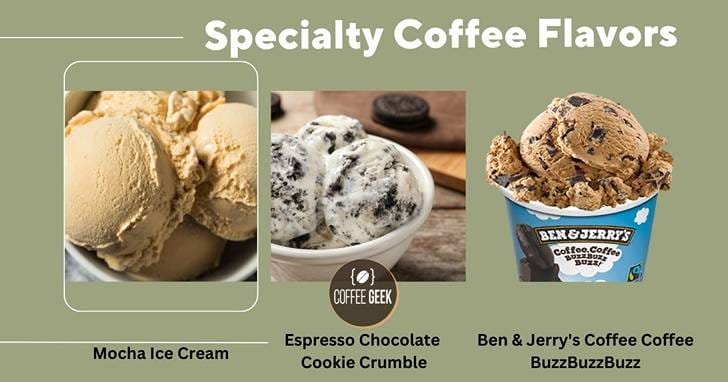
As the name suggests, this ice cream features a strong espresso base, which is then swirled with generous amounts of chocolate-based ingredients, such as fudge or chocolate chips.
The added cookie crumbles bring a delightful crunch and texture to the mix. Due to the presence of actual espresso, this ice cream’s caffeine content is potentially higher than other coffee ice cream variations.
Coffee Coffee BuzzBuzzBuzz
One notable coffee ice cream flavor is Ben & Jerry’s Coffee Coffee BuzzBuzzBuzz, which marries coffee ice cream with espresso bean fudge chunks.
This sumptuous treat is not only indulgent but also offers a substantial caffeine kick.
The presence of both coffee ice cream and espresso bean fudge chunks results in a higher caffeine content compared to other coffee-flavored ice creams.
While the amount of caffeine will vary depending on the serving size, it is safe to assume that Coffee Coffee BuzzBuzzBuzz packs more of a caffeinated punch than its milder counterparts.
Decaf and Caffeine-Free Coffee Ice Cream
Decaf Coffee Ice Cream
Decaf coffee ice cream is an excellent option for those who enjoy the taste of coffee but want to limit their caffeine intake.
Most coffee ice creams contain caffeine, but there are some brands offering decaf versions, giving consumers a tasty flavor without the potential side effects of caffeine, such as restlessness or insomnia.
To make decaf coffee ice cream, the manufacturing process involves using decaffeinated coffee beans or flavors to infuse the ice cream base.
Decaf coffee has a lower caffeine content than regular coffee, typically containing between 4.3mg to 6.9mg of caffeine per cup 2.
Decaf coffee ice cream, therefore, could have a lower caffeine content compared to its regular counterpart, allowing you to indulge without worrying about caffeine-related side effects.
Caffeine-Free Alternatives
If you’re looking for completely caffeine-free coffee ice cream alternatives, there are some ingredient substitutes that can mimic the flavor without containing any caffeine.
These alternatives use natural ingredients such as chicory root or dandelion root, which have a similar taste profile to coffee but are caffeine-free.
Chicory root: Chicory root is a popular caffeine-free coffee substitute known for its dark, earthy taste.
It can be used to create a more coffee flavor base for ice cream without introducing any caffeine. It’s also rich in fiber, which can aid digestion.
Dandelion root: Dandelion root is another caffeine-free alternative that has a slightly bitter, coffee-like flavor.
It can replace coffee in caffeine-free ice cream recipes and provides additional health benefits, such as antioxidant properties and liver support.
Apart from these natural alternatives, some companies manufacture completely caffeine-free, coffee-flavored ice creams made with artificial flavors.
These products can be a good alternative for those who are sensitive to caffeine but still enjoy the taste of coffee and ice cream.
Don’t hesitate to get creative with your caffeine-free ice cream! You can add ingredients such as garlic, dates, or figs to create unique coffee flavoring profiles and textures.
These ingredients not only enhance the flavor of your ice cream but also have nutritional benefits, making your dessert both tasty and guilt-free.
Factors Affecting Caffeine Sensitivity
Individual Differences
Caffeine sensitivity varies among individuals due to factors such as genetics, age, and tolerance levels.
For instance, some people are naturally more sensitive to the anxiety-promoting effects of caffeine, while others may experience insomnia or sleep disturbances after consuming similar amounts of caffeine.
Furthermore, about 10% of the population is considered hyposensitive to caffeine, meaning they can tolerate higher-than-normal amounts of caffeine without experiencing adverse effects.
Amount of Caffeine Intake
The amount of caffeine intake also plays a significant role in determining an individual’s caffeine sensitivity. How much coffee? Up to 400 milligrams of caffeine per day is generally considered safe for most adults.
However, people with a low tolerance may experience symptoms such as jitteriness, headaches, diarrhea, or insomnia when consuming smaller doses of caffeine.
It is essential to monitor one’s daily caffeine consumption, including sources like coffee, tea, soda, and even coffee and ice cream, to maintain a healthy balance and avoid potential health issues.
Nutritional Considerations for Coffee Ice Cream
Sugar Content
Coffee ice cream can contain a significant amount of sugar, which contributes to its overall caloric content and taste.
Some brands may use natural sweeteners, such as cane sugar, while others may rely on high-fructose corn syrup or artificial sweeteners.
It’s important for consumers to check product labels to determine the specific sugar content in their chosen coffee ice cream.
Nevertheless, moderation should be practiced when enjoying these sweet treats. High sugar intake may lead to health problems such as obesity, heart disease, and diabetes.
Serving Sizes
When indulging in coffee ice cream, it’s crucial to keep in mind appropriate serving sizes to avoid excessive consumption.
A standard serving size for ice cream is typically 1/2 cup (about 106 grams). In this quantity, the calories from coffee ice cream can range from 200 to 270 depending on the brand and recipe.
This serving size may also contain between 17 to 24g of sugar, and minimal trace amounts of dietary fiber.
Moreover, the caffeine content in coffee ice cream is not the same among brands, but it often does not exceed 25 milligrams per ⅔ cup serving.
This is a relevant consideration for those who are sensitive to caffeine or plan to enjoy their desserts late at night.
In conclusion, when enjoying coffee ice cream, it’s essential to keep nutritional considerations in mind, such as sugar content and serving sizes.
Behaving consciously can help maintain a balanced diet and avoid potential health issues.
Caffeine and Health Effects
Caffeine, a natural stimulant, is commonly found in coffee, tea, soda, and even coffee ice cream. It acts on the central nervous system, promoting alertness and energy.
When consuming products like coffee ice cream, it’s important to consider the potential health effects of caffeine.
A moderate amount of caffeine intake can provide benefits such as increased alertness, improved cognitive function, and enhanced physical performance.
However, excessive consumption can lead to negative side effects like restlessness, increased heart rate, and insomnia.
Individual tolerance to caffeine varies, and up to 400 milligrams (mg) per day is considered safe for most healthy adults, which is equivalent to about four cups of brewed coffee.
A ½ cup serving of Häagen-Dazs coffee ice cream contains around 21.6 mg of caffeine, while a full 14 oz carton has approximately 75.6 mg. It’s essential to factor this amount into one’s daily caffeine intake to avoid any adverse effects.
Some common symptoms of excessive consuming caffeine include:
Jitters
Anxiety
Rapid or irregular heartbeat
Sleep disturbances
Digestive issues
To maintain a healthy relationship with caffeine, it’s important for coffee lovers to be aware of the sources and amounts consumed daily. Balancing one’s caffeine intake and focusing on a varied diet is crucial for overall well-being.
In conclusion, while coffee ice cream can be an enjoyable treat for many, it’s necessary to keep its caffeine content in mind.
Consuming moderate amounts of caffeine can boost alertness and energy, but too much can lead to negative health effects.
By staying informed about the caffeine content in various products, it’s possible to maintain a balanced and enjoyable diet.
Frequently Asked Questions
How much caffeine is in Haagen-Dazs coffee ice cream?
Haagen-Dazs coffee ice cream contains 43.2 milligrams of caffeine per 1 cup serving, which is a little less than half of the 94.8 milligrams found in a cup of coffee.
Is there caffeine in Oatly Frozen Dessert Non-Dairy?
While exact caffeine content for Oatly Frozen Dessert Non-Dairy is not readily available, it’s important to know that if the product is made with real coffee or contains coffee extract, then it most likely contains caffeine as well.
Checking the ingredient list for actual coffee or coffee extracts can help determine if there is caffeine in this product.
What is the caffeine content in Talenti Gelato?
The caffeine content in Talenti’s Coffee Chocolate Chip Gelato is 24 milligrams per 1/2 cup serving. This is significantly lower than the amount of caffeine found in a typical cup of coffee drink.
How much caffeine is in McConnell’s Turkish Coffee Ice Cream?
McConnell’s does not provide exact caffeine content information for their Turkish Coffee Ice Cream. However, if it’s made with coffee as a primary ingredient, then it is likely to contain some caffeine.
To be more certain, it is best to contact McConnell’s directly for specific caffeine numbers.
Does Kemps Caribou Coffee Java Chunk Ice Cream contain caffeine?
Yes, Kemps Caribou Coffee Java Chunk Ice Cream does contain caffeine. While the same amount is not specified, since this product is made with actual Caribou Coffee, it can be assumed that it contains a noticeable amount of caffeine.
What is the caffeine amount in Jeni’s Ice Cream Coffee with Cream & Sugar?
Jeni’s does not provide exact caffeine content for their Coffee with Cream & Sugar ice cream. Like with other brands mentioned previously, if the ice cream is made with real coffee or coffee extract, it is likely to contain caffeine.
To obtain specific caffeine numbers, it is recommended to contact Jeni’s directly.

